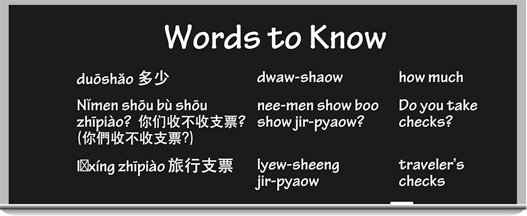Chinese For Dummies (106 page)
Read Chinese For Dummies Online
Authors: Wendy Abraham
Talkin' the Talk
Heather goes shopping in Taipei and finds something she likes. She asks the clerk how much it is.
Heather:
QÇngwèn, zhè jià n yÄ«fu duÅshÇo qián?
cheeng-one, jay jyan ee-foo dwaw-shaow chyan?
Excuse me, how much is this piece of clothing?
Clerk:
ÃrshÃwÇ kuà i.
are-shir-woo kwye.
It's $25.
Heather:
NÇmen shÅu bù shÅu zhÄ«pià o?
nee-men show boo show jir-pyaow?
Do you take checks?
Clerk:
LÇxÃng zhÄ«pià o kÄyÇ. Xìnyòng kÇ yÄ kÄyÇ.
lyew-sheeng jir-pyaow kuh-yee. sheen-yoong kah yeah kuh-yee.
Traveler's checks are okay. Credit cards are also okay.

Paying with plastic
The
xìnyòng kÇ
ä¿¡ç¨å¡
(sheen-yoong kah) (
credit card
) may be the greatest invention of the
20th century â for credit card companies, that is. Everyone else is often stuck paying all kinds of potentially exorbitant
lìlÇ
å©ç
(lee-lyew) (
interest rates
) if they're not careful. Still, credit cards do make paying for things much more convenient, don't you agree?
To find out whether a store accepts credit cards, all you have to say is
NÇmen shÅu bù shÅu xìnyòng kÇ?
ä½ ä»¬æ¶ä¸æ¶ä¿¡ç¨å¡
? (
ä½ åæ¶ä¸æ¶ä¿¡ç¨å¡
?) (nee-men show boo show sheen-yoong kah?) (
Do you accept credit cards?
)
Whether the
jià gé
ä»·æ ¼
(
å¹æ ¼
)
(jyah-guh) (
price
) of the items you want to buy is
guì
è´µ
(
è²´
)
(gway) (
expensive
) or
piányì
便å®
(pyan-yee) (
cheap
), the
xìnyòng kÇ
comes in handy.
Read on for a list of credit-card-related terms:
 shÄzhà ng de zuì gÄo é
shÄzhà ng de zuì gÄo é
èµå¸çæé«é¢
(
è³å¸³çæé«é¡
) (shuh-jahng duh dzway gaow uh) (
credit line
)
 shÅu
shÅu
æ¶
(show) (
accept
)
 xìnyòng
xìnyòng
ä¿¡ç¨
(sheen-yoong) (
credit
)
 xìnyòng xià n'é
xìnyòng xià n'é
ä¿¡ç¨éé¢
(
ä¿¡ç¨éé¡
) (sheen-yoong shyan-uh) (
credit limit
)
Doing Your Banking
If you plan on staying in Asia for an extended time or you want to continue doing business with a Chinese company, you may want to open a
huóqī zhà nghù
æ´»æè´¦æ·
(
æ´»æ賬æ¶
)
(hwaw-chee jahng-hoo) (
checking account
) where you can both
cún qián
åé±
(
åé¢
)
(tswun chyan) (
deposit money
) and
qÇ qián
åé±
(
åé¢
)
(chyew chyan) (
withdraw money
). If you stay long enough, you should open a
dìngqÄ« cúnkuÇn hùtóu
å®æå款æ·å¤´
(
å®æå款æ¶é
) (deeng-chee tswun
-
kwan hoo-toe)
(
savings account
) so you can start earning some
lìxÃ
å©æ¯
(lee-she) (
interest
). Sure beats stuffing large bills under your mattress for years.
How about trying to make your money work for you by investing in one of the following?
 chÇxù cúnkuÇn
chÇxù cúnkuÇn
å¨èå款
(
å²èå款
) (choo-shyew tswun-kwan) (
certificate of deposit/CD
)
 guókù quà n
guókù quà n
å½åºå¸
(
å庫å¸
) (gwaw-koo chwan) (
treasury bond
)
 gÇpià o
gÇpià o
è¡ç¥¨
(goo-pyaow) (
stock
)
 hùzhù jījīn
hùzhù jījīn
äºå©åºé
(hoo-joo jee-jeen) (
mutual fund
)
 tà otóu jījīn
tà otóu jījīn
å¥å¤´åºé
(
å¥é åºé
) (taow-toe jee-jeen) (
hedge fund
)